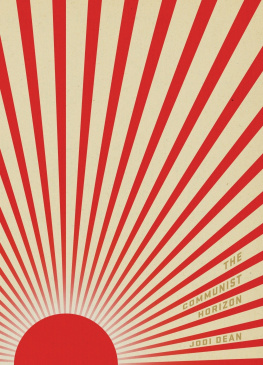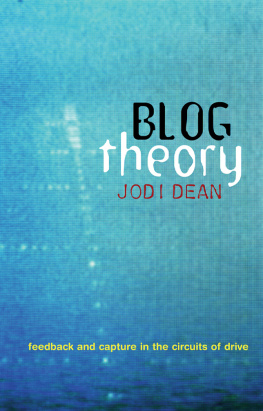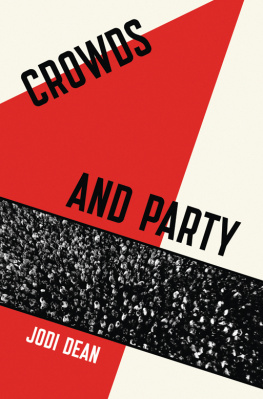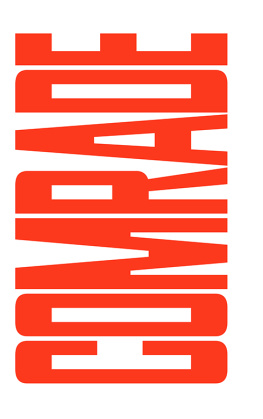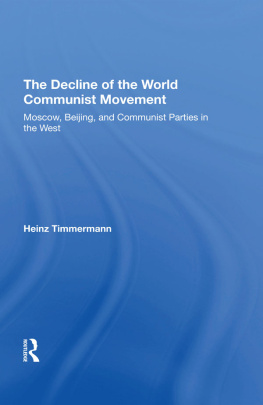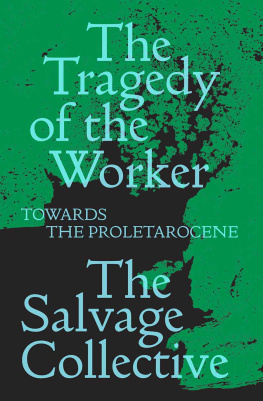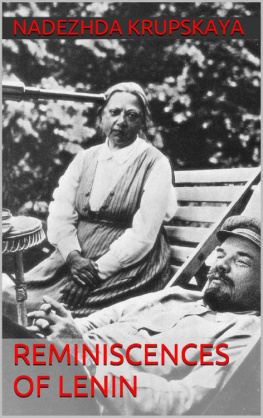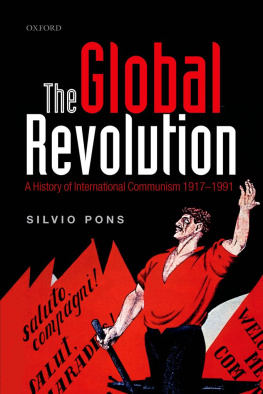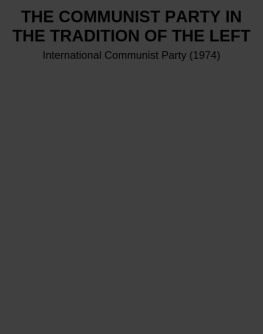The Communist Horizon
JODI DEAN

London New York
First published by Verso 2012
Jodi Dean 2012
All rights reserved
The moral rights of the author have been asserted
1 3 5 7 9 10 8 6 4 2
Verso
UK: 6 Meard Street, London W1F 0EG
U.S.: 20 Jay Street, Suite 1010, Brooklyn, NY 11201
www.versobooks.com
Verso is the imprint of New Left Books
eISBN: 978-1-84467-955-3
British Library Cataloguing in Publication Data
A catalogue record for this book is available from the British Library
Library of Congress Cataloging-in-Publication Data
A catalog record for this book is available from the Library of Congress
Introduction
T he term horizon marks a division. Understood spatially, the horizon is the line dividing the visible, separating earth from sky. Understood temporally, the horizon converges with loss in a metaphor for privation and depletion. The lost horizon suggests abandoned projects, prior hopes that have now passed away. Astrophysics offers a thrilling, even uncanny, horizon: the event horizon surrounding a black hole. The event horizon is the boundary beyond which events cannot escape. Although event horizon denotes the curvature in space/time effected by a singularity, its not much different from the spatial horizon. Both evoke a fundamental division that we experience as impossible to reach, and that we can neither escape nor cross.
I use horizon not to recall a forgotten future but to designate a dimension of experience that we can never lose, even if, lost in a fog or focused on our feet, we fail to see it. The horizon is Real in the sense of impossible we can never reach itand in the sense of actual (Jacques Lacans notion of the Real includes both these senses). The horizon shapes our setting. We can lose our bearings, but the horizon is a necessary dimension of our actuality. Whether the effect of a singularity or the meeting of earth and sky, the horizon is the fundamental division establishing where we are.
With respect to politics, the horizon that conditions our experience is communism. I get the term communist horizon from Bruno Bosteels. In The Actuality of Communism , Bosteels engages with the work of lvaro Garca Linera. Garca Linera ran as Evo Moraless vice presidential running mate in the Bolivian Movement for SocialismPolitical Instrument for the Sovereignty of the Peoples (MAS-IPSP). He is the author of multiple pieces on Marxism, politics, and sociology, at least one of which was written while he served time in prison for promoting an armed uprising (before becoming vice president of Bolivia, he fought in the Tupac Katari Guerrilla Army). Bosteels quotes Garca Lineras response to an interviewers questions about his partys plans following their electoral victory: The general horizon of the era is communist. Garca Linera doesnt explain the term. Rather, as Bosteels points out, Garca Linera invokes the communist horizon as if it were the most natural thing in the world, as if it were so obvious as to need neither explanation nor justification. He assumes the communist horizon as an irreducible feature of the political setting: We enter the movement with our expecting and desiring eyes set upon the communist horizon. For Garca Linera, communism conditions the actuality of politics.
Some on the Left dismiss the communist horizon as a lost horizon. For example, in a postmodern pluralist approach that appeals to many on the Left, the economists writing as J. K. Gibson-Graham reject communism, offering post-capitalism in its stead. They argue that descriptions of capitalism as a global system miss the rich diversity of practices, relations, and desires constituting yet exceeding the economy and so advocate reading the economy for difference rather than dominance (as if dominance neither presupposes nor relies on difference). In their view, reading for difference opens up new possibilities for politics as it reveals previously unacknowledged loci of creative action within everyday economic activities.
Gibson-Graham do not present Marxism as a failed ideology or communism as the fossilized remainder of an historical experiment gone horribly wrong. On the contrary, they draw inspiration from Marxs appreciation of the social character of labor. They engage Jean-Luc Nancys emphasis on communism as an idea that is the index of a task of thought still and increasingly open. They embrace the reclamation of the commons. And they are concerned with neoliberalisms naturalization of the economy as a force exceeding the capacity of people to steer or transform it.
Yet at the same time, Gibson-Graham push away from communism to launch their vision of post-capitalism. Communism is that against which they construct their alternative conception of the economy. Its a constitutive force, present as a shaping of the view they advocate. Even as Nancys evocation of communism serves as a horizon for their thinking, they explicitly jettison the term communism, which they position as the object of widespread aversion and which they associate with the dangers of posing a positivity, a normative representation. Rejecting the positive notion of communism, they opt for a term that suggests an empty relationality to the capitalist system they ostensibly deny, post-capitalism. For Gibson-Graham, the term capitalist is not a term of critique or opprobrium; its not part of a manifesto. The term is a cause of the political problems facing the contemporary Left. They argue that the discursive dominance of capitalism embeds the Left in paranoia, melancholia, and moralism.
Gibson-Grahams view is a specific instance of a general assumption shared by leftists who embrace a generic post-capitalism but eschew a more militant anticapitalism. Instead of actively opposing capitalism, this tendency redirects anticapitalist energies into efforts to open up discussions and find ethical spaces for decisionand this in a world where one bond trader can bring down a bank in a matter of minutes.
I take the opposite position. The dominance of capitalism, the capitalist system , is material. Rather than entrapping us in paranoid fantasy, an analysis that treats capitalism as a global system of appropriation, exploitation, and circulation that enriches the few as it dispossesses the many and that has to expend an enormous amount of energy in doing so can anger, incite, and galvanize. Historically, in theory and in practice, critical analysis of capitalist exploitation has been a powerful weapon in collective struggle. It persists as such today, in global acknowledgment of the excesses of neoliberal capitalism. As recently became clear in worldwide rioting, protest, and revolution, linking multiple sites of exploitation to narrow channels of privilege can replace melancholic fatalism with new assertions of will, desire, and collective strength. The problem of the Left hasnt been our adherence to a Marxist critique of capitalism. Its that we have lost sight of the communist horizon, a glimpse of which new political movements are starting to reveal.
Sometimes capitalists, conservatives, and liberal-democrats use a rhetoric that treats communism as a lost horizon. But usually they keep communism firmly within their sight. They see communism as a threat, twenty years after its ostensible demise. To them, communism is so threatening that they premise political discussion on the repression of the communist alternative. In response to left critiques of democracy for its failure to protect the interests of poor and working-class people, conservatives and liberals alike scold that everybody knows and history shows that communism doesnt work. Communism might be a nice ideal, they concede, but it always leads to violent, authoritarian excesses of power. They shift the discussion to communism, trying to establish the limits of reasonable debate. Their critique of communism establishes the political space and condition of democracy. Before the conversation even gets going, liberals, democrats, capitalists, and conservatives unite to block communism from consideration. Its off the table.
Next page
